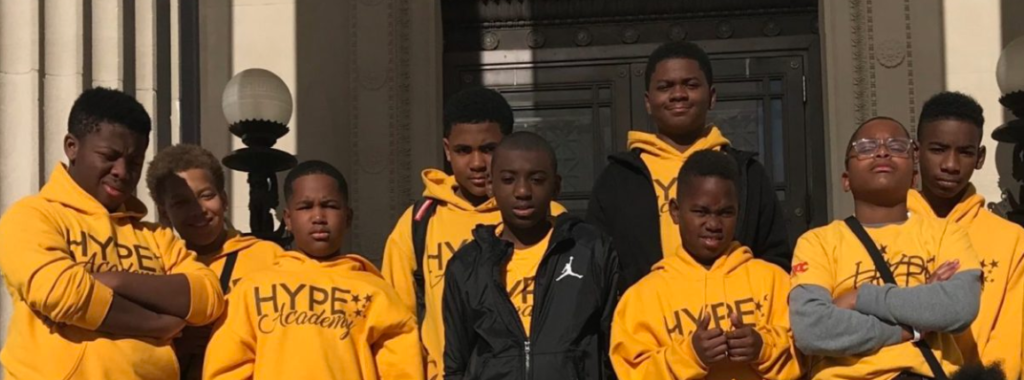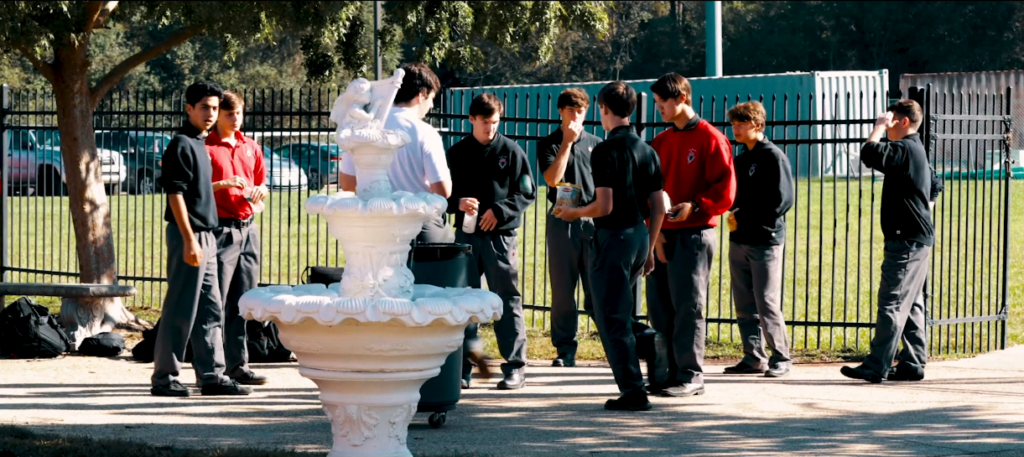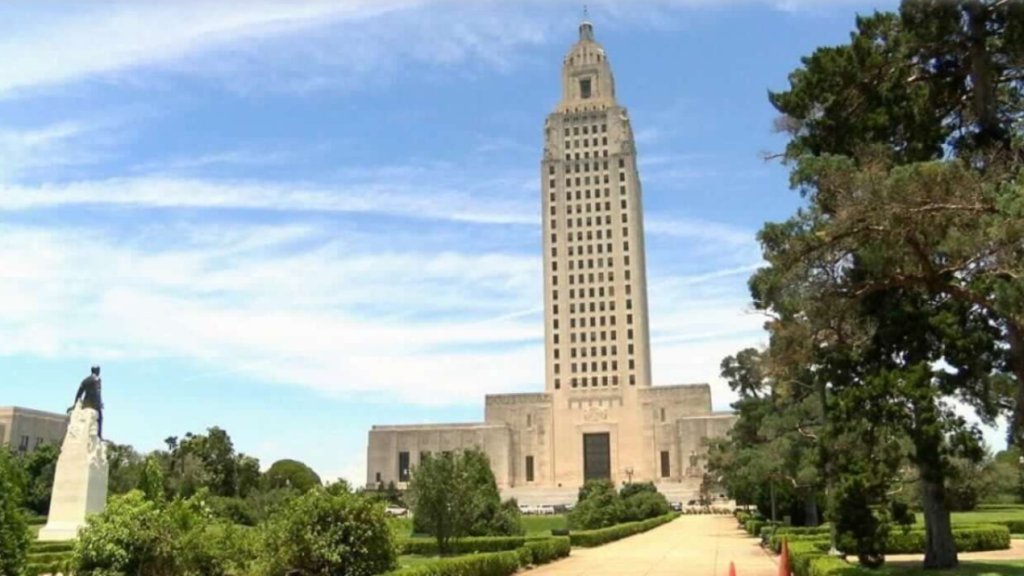
HYPE (Helping Young People Excel) Academy is a private school in New Orleans serving fifth through 12th grade students who benefit from a low student-teacher ratio. The school accepts income-based scholarships available through the Louisiana Department of Education and the ACE and ARETE scholarship programs.
Editor’s note: Denisha Merriweather, director of family engagement at the American Federation for Children and founder of Black Minds Matter, recently interviewed Arianne Craig Jolla, who had dreamed of being a teacher since she was in fourth grade. Frustrated with school administrators who expected her to “teach to the test,” which wasn’t working for students who needed help with basic math and reading skills, she left the system and started her own school, HYPE Academy, in New Orleans. Here is an excerpt of Merriweather’s interview.
Merriweather: Where did the vision to found HYPE Academy come from?
Craig Jolla: My mom was a para-teacher (teacher’s assistant) for about 23 years, so education was a big deal. Even though she was a single mother who lived in poverty, she made sure to help us in every way she could. My mother would take us to the library where we would do our book reports and other school related work. That really helped to develop my love for learning, but the bug to teach and educate was born in my fourth-grade teacher’s classroom.
When I walked into Mrs. Weber’s classroom and she put her name and phone number on the board, it felt different. We did not think teachers were human; We looked at our teachers as superheroes. So, when she put her number on the board it just made her feel so much more accessible.
I remember thinking, “Oh my God, I really want to do for other kids what she did for me.” She made me feel safe, cared about, and she made me feel like I mattered. I knew then that I wanted to go into elementary education. So, I attended Dillard University here in New Orleans and got my bachelor’s degree in elementary and special education. I started teaching immediately that summer and I also started working on my master’s degree.
I started teaching and I absolutely hated it. I hated waking up in the morning. I hated going into the classroom and it was mainly because I felt like a failure. I felt like my vision of teaching was to go in and do for those kids which she had done for me. However, the reality of it was that I was hired to teach a test. I was hired to prepare kids for standardized testing.
It was also difficult to take in account all the other things these children had to overcome. Many of them came to me without having a foundation. For a lot of them they had no basic math or reading skills. To be honest, there was this humongous gap between what I was expected to do, perform miracles in my opinion, and what the reality was. These kids were not equipped with the basics. I did that for about five years before I decided to go to a different parish to teach.
I started teaching in the top parish in the state. I thought that this parish would be better. When I started teaching there, I was one of maybe two African American teachers in the school and most of my kids were not African American either. In the back of my mind I thought, “It must be us.” For a moment I thought it must be an African American problem.
However, when I started teaching there it was the same as my last parish. That is when I realized it was a system problem. I believe that our system is set up for kids to fail.
At this time, I was teaching at a middle school. I remember one day we were called out of our planning periods to have a department meeting. This happened very often. The principal started to chide us because our children had not reached their benchmarks. I remember one of my colleagues said, “How in the world do you expect us to teach these kids how to pass this test when many of them cannot do basic math or reading?”
I will never forget what the principal said, “I don’t care what you do. Just get them out of here and let them be high school’s problem next year.” This happened around October. By Christmas I had put in my two weeks and by January we started HYPE Academy.
To read more, click here.

St. Michael the Archangel High School in Baton Rouge is one of 128 private schools that participate in the Louisiana Scholarship Program. The program enrolled 6,141 students in 2020-21.
A new poll from the state of Louisiana’s voice for educational choice has found widespread support among families who participate in the Louisiana Scholarship Program.
Nearly 93% of families who utilize the program to provide their children with additional opportunities to attend the school of their choice say they are happy with their children’s academic progress. Ninety-one percent say they are satisfied or very satisfied with their child’s current scholarship school, and nearly all – 97.8% – say their child feels safe in his or her scholarship school.
Additionally, 54.8% are pleased with how their scholarship school handled the COVID-19 crisis.
The Louisiana Federation for Children conducted the survey from March 18-March 31 to evaluate the level of parental satisfaction with the scholarship program formerly known as the Student Scholarships for Educational Excellence Program.
“Facing extreme obstacles, Louisiana Scholarship Program schools created safe learning environments for parents who prioritized in-person learning,” said Ann Duplessis, Louisiana Federation for Children President and American Federation for Children Board Member. “At the same time, families who preferred a virtual education for their children were accommodated.”
The Louisiana Department of Education reported 6,141 students were enrolled in the Louisiana Scholarship Program during the 2020-21 school year. Every child in the program, which was enacted in 2008 by a bipartisan group of legislators, comes from a low-income family, and 85% of students in the program are minority students.
Louisiana lawmakers recently expanded school choice options with the approval of HB 85, which established a statewide reading scholarship program named for the late state Rep. Steve Carter, a former Louisiana House education chairman who died in January from COVID-19 complications.
The program, approved on a unanimous bipartisan vote, was modeled after a similar one in Florida. You can read more here.
To view complete poll results, click here.
 Help is on the way for struggling young readers in the Pelican State, thanks to some inspiration from the Sunshine State.
Help is on the way for struggling young readers in the Pelican State, thanks to some inspiration from the Sunshine State.
Lawmakers in Louisiana recently approved HB 85, which established a statewide reading scholarship program named for the late state Rep. Steve Carter, a former Louisiana House education chairman who died in January from COVID-19 complications. Carter was known for his support of statewide school choice scholarships.
The program, approved on a unanimous bipartisan vote, was modeled after a similar one in Florida, which was the first of its kind in the nation when lawmakers approved it in 2018. The program served 5,375 Florida students in its inaugural year and 6,285 students during 2019-20. Figures released last week show that 3,496 students were found eligible in 2020-21, although the actual number may be higher; standardized tests, which are used to determine eligibility, were not given in 2020 due to the pandemic.

Louisiana State Rep. Steve Carter
“This literacy program was the final legislative initiative championed by Rep. Steve Carter before leaving the legislature in 2020,” said Kelli Bottger, American Federation for Children’s Regional Government Affairs Director. “Rep. Carter worked tirelessly throughout his career to ensure Louisiana’s children, regardless of their ZIP code or income level, had access to a quality education through school choice. His idea couldn’t come at a better time when far too many Louisiana children are dealing with significant learning loss due to the COVID-19 pandemic.”
The Louisiana program offers parents of struggling readers access to an annual $1,000 reading scholarship account, a type of education savings account that can be used for tuition and fees related to part-time tutoring, summer and after-school literacy programs, instructional materials and more.
Scholarship accounts will be available to public school students in grades K-5 who have reading difficulties which, according to the legislature, is about 160,000 students, and students in kindergarten through third grade who either read below grade level or are deemed “at risk” for reading difficulties.
The program also is designed to help fourth and fifth graders “who scored below mastery in English language arts on the state assessment in the prior school year” or were “recommended by an English teacher.”
“Louisiana students have struggled with literacy for decades,” Rep. Scott McKnight (R-Baton Rouge) said in April when he introduced the bill to the House Education Committee. “It’s time for literacy to become a priority in our state.”
Modeled after the Florida program, the Louisiana program includes some key differences. It doubles the scholarship amount and covers three additional grades, though the state is still searching for a way to pay for the program’s projected $159 million cost.
Florida’s program offers $500 per student in grades 3 through 5 who scored a performance level of 1 or 2 on the English Language test, with priority given to students who are classified as English Language Learners. The program pays for tuition and fees related to part-time tutoring, summer and after-school literacy programs, instructional materials and curricula related to reading or literacy.
Step Up For Students, which hosts this blog, administrates Florida’s Reading Scholarship Program.
Florida lawmakers expanded the state’s literacy improvement efforts when they approved HB 7011, which identifies and helps students who have deficiencies in reading by implementing voluntary pre-K through eighth grade screening and progress monitoring. HB 3, championed by House Speaker Chris Sprowls, R-Palm Harbor, gives free books for academically struggling K-5 students, with the goal of helping them overcome literacy challenges.
Sprowls, in promoting the new reading initiatives, said that while Florida has made amazing strides in reading in recent years, “it would take 230 years for every child in the state to read at grade level” at current progress levels.
Recent results from the Florida Department of Education show the average drop in third grade reading scores was 4 percentage points statewide. Overall, 54% of third graders passed the spring exams compared to 58% in 2019 when the tests were given before testing was canceled due to the pandemic.
About half of the 67 districts in 2021 had larger drops then the 4-point figure, the state data show.
According to information for parents prepared by the Department, third grade is when students who are behind in reading have more difficulty. Florida law says third graders who do not score at least a Level 2 on the state reading test will not be promoted to fourth grade.
Arizona: A former school teacher criticizes the state superintendent of public instruction for his support of Common Core and school choice (East Valley Tribune). The Sierra Vista Herald editorial board says the state superintendent's support of ESAs hurts public schools. Applications for Empowerment Scholarship Accounts doubles (Heartlander). The Arizona Republic editorial board opposes allowing public funding to go to private schools, especially now that the state support for ESAs exceeds the state support for public schools (note: the editorial board's calculation excludes local support for public schools). A consultant at a scholarship organization is indicted for stealing $529,000 in scholarship money (Arizona Republic).
California: Vanila Singh, a professor and physician at Stanford University and congressional candidate, says school choice is the key to student success (Mercury News). The California Charter Schools Association has sued the West Contra Costa School District for withholding tax revenue intended to fund charter schools (Contra Costa Times). Charter schools struggle with online assessments (FSRN Radio).
D.C.: Two charter schools allegedly under federal investigation for possible discrimination say they have never received a complaint from a student or parent (Washington Post). President Obama sends his daughters to Sidwell Friends, an elite private school that refuses to release information on student course completion and graduation rates (Washington Post).
Florida: The tax-credit scholarship expansion will allow the program to serve higher-income families (Education Week, Tampa Tribune, WJHG TV). More low-income families will benefit from the tax-credit scholarship program if the Governor signs the bill into law (Florida Times-Union). The state passes the nation's second education savings account program (Foundation for Excellence in Education). Daphne Cambell (D-Miami-Dade) says she voted to expand the program because giving poor kids more options is the right thing to do (Miami Herald). The Tampa Tribune editorial board says the scholarship expansion is justified because every student deserves to find a school that works well for them. Brian Tilson, owner of a communications firm in Boca Raton, says the scholarships are unpopular and are hurting public schools (Gainesville Sun). Ron Matus, the editor of redefinED, says more progressive Democrats support parental choice (Gainesville Sun). The scholarship program helps families afford Jewish day schools (Chabad News). State Impact talks with Sen. John Legg about the legislative session including the passage of the scholarship bill. Marc Yacht, a retired physician, say charter schools should be more regulated and held to the same standards and rules as traditional public schools (Sun Sentinel).
Georgia: The Southern Education Foundation helps file a suit to overturn the state's tax-credit scholarship program (Watchdog). A former reporter sends her daughter to a charter school and says each school is so different it is difficult to compare them to each other let alone public schools, and that is a good thing (Atlanta Journal Constitution). (more…)
 Alabama: The Institute for Justice, a national civil rights law firm, says vouchers are constitutional in the state (Al.com).
Alabama: The Institute for Justice, a national civil rights law firm, says vouchers are constitutional in the state (Al.com).
Alaska: School choice opponents voice their concerns at a public hearing over a constitutional amendment to allow public funding of private schools (Anchorage Daily News, Nonprofit Quarterly). The proposed constitutional change passes the House Education Committee but the amendment faces a tough road ahead (Anchorage Daily News). There are 27 charter schools in the state with no cap on how many schools may operate (Alaska Dispatch).
Arizona: The state has many school choice programs (Camp Verde Bugle). A state court rules the Department of Education cannot recoup $5.9 million in over-payments to charter schools due to a change in teacher performance pay because it didn't notify the schools of the rule change (Arizona Republic). Charter school operators plan to open 25 new charter schools in Phoenix (Arizona Republic).
California: Parent trigger elicits emotions from parents on both sides (Hechinger Report). The superintendent of LA Unified says every "student has the right to a choice of a highly effective school" (Reason Magazine). San Diego school board members are attempting to exclude some charter schools from receiving bond money approved by city voters (Fox 5 San Diego).
D.C.: A new study reveals area charter schools are being shortchanged on student funding compared with district schools (Washington Post).
Florida: School choice is growing by leaps and bounds (Sunshine State News). The Palm Beach Post editorial board says giving students public school choice could reduce the disadvantages faced by low-income students. After 17 years as president and CEO of Florida Virtual School, Julie Young announces her retirement (redefinED, Orlando Business Journal). Gov. Rick Scott proposes allowing charter schools access to construction funds if they serve students within attendance zones of low-performing public schools (Tallahassee Democrat).
Georgia: A lawmaker wishes to expand the tax credit scholarship program with a $100 million cap (GPB News).
Illinois: Nobel charter schools name thee schools after donors who give $1 million or more, but the donors do not decide curriculum or which teachers to hire (Chicago Sun Times).
Indiana: The Lafayette Journal & Courier editorial board argues that private schools should continue to take the state test in order to create a fair comparison with public schools. Since vouchers can be worth no more than 90 percent of per-pupil state funding to local school districts, vouchers save the state money (Indianapolis Daily Star). Five voucher schools in the state say they teach intelligent design or creationism (Journal-Gazette). The Star Press editorial board worries that allowing students to use vouchers without ever attending public school creates two classes of education. (more…)
 Alabama: Applications for the state's new tax credit scholarship program are now open (Alabama Opportunity Scholarship Fund, WTVY)
Alabama: Applications for the state's new tax credit scholarship program are now open (Alabama Opportunity Scholarship Fund, WTVY)
Arizona: Three charter schools will be shut down for poor performance (Arizona Business Journal).
California: The L.A. metro area has the largest number of students attending charter schools in the nation (LA School Report). Charter school growth booms in L.A. and San Diego (San Diego Union Tribune).
Georgia: NPR asks "what is school choice?" (WABE). Hall County ranks No. 1 in the nation for charter school enrollment growth (Access North Georgia). Charter school enrollment grows in the state as more schools request permission to convert to charters (Atlanta Journal Constitution).
Florida: If Catholic schools were a district, they'd be the 9th largest in the state (redefinED). 80,000 students attend charter schools in Miami-Dade, making it the 6th largest (numerically) metro charter area in the nation (Miami Herald). A virtual charter school is approved to set up shop in Pinellas County (Tampa Bay Tribune). Across the bay in Hillsborough, a school board votes down a charter school request by MacDill Air Force Base (redefinED). The number of students using "opportunity scholarships" to leave poor-performing schools doubles in Duval County (Florida Times Union). Florida Virtual School offers students flexibility (Townhall.com).
Indiana: Gov. Mike Pence wants vouchers for pre-k students (Indianapolis Star, Greenfield Reporter). Pence thinks charter school networks should be allowed to operate more like school districts (Courier-Journal). Public school districts will have to hold lotteries for public school choice if demand exceeds supply (Education Week). Gary ranks 5th in the nation for charter school enrollment (Post Tribune).
Louisiana: The Louisiana Association of Business and Industry is the most influential organization on education reform, according to a Brookings Institute study (Times Picayune). New Orleans has the largest percentage of students attending charter schools of any city in the nation...for 8 years in a row (Times Picayune). (more…)
Alabama: The Alabama Education Association sued to stop the state's education tax-credit program but a parent steps forward to try and block the suit with the help of the Institute for Justice (Associated Press).
Arizona: The Friedman Foundation for Educational Choice surveys parents using education savings accounts and finds they're happy with the program (Friedman Foundation).
Colorado: Two internet radio talk show hosts speak in Douglas County against school vouchers and "corporate" education reform (Lone Tree News).
D.C.: The government shutdown threatens the funding of the District's public school system including charter schools (Washington Times).
Florida: Tampa Bay area private schools are seeing enrollment growth thanks to a rebounding economy and school choice (Tampa Bay Times). GEICO donates $2 million to Step Up For Students, the non-profit that operates Florida's education tax-credit scholarship program for low-income students (PR Web). The McKay scholarship program serves 27,000 special needs students in Florida (Tallahassee.com). A group is suing the state to get more money for public schools, saying it is unfair to devote resources to charter and virtual schools (Miami Herald). Florida Virtual School wins the first round of court battles against K12 Inc. over trademark violations (EdWeek).
Georgia: Atlanta area KIPP charter schools received a group charter allowing them to pool resources (Atlanta Journal-Constitution).
Indiana: The state could be the No. 1 state for school vouchers if the growth continues (Indianapolis Star). Gov. Mike Pence talks education reform and school choice at the Education Nation summit (WNDU.com). A state report says voucher schools outperform the public schools but it is still unclear if the voucher schools are creating a bigger impact per student (Associated Press).
Iowa: A new survey by the Friedman Foundation shows a majority of parents in Iowa support having a school voucher program (Quad City Times, Waterloo Cedar Falls Courier). One local newspaper columnist calls school choice "insidiously popular" (Daily Iowan).
Louisiana: The state's voucher program actually promotes desegregation (National Review). A Ruston area private school that was kicked off the voucher program sues, claiming discrimination (The Advocate). Parents in Lafayette protest two charter school operators seeking authorizing in the parish (KATC.com). (more…)
 Editor's note: "Blog stars" is our occasional roundup of thoughtful stuff from other ed blogs and sometimes a newspaper or two.
Editor's note: "Blog stars" is our occasional roundup of thoughtful stuff from other ed blogs and sometimes a newspaper or two.
Don't forget course choice
From a Shreveport Times op-ed: Nearly all of us have had an experience where we were stuck in a class in which no matter how many times the teacher explained a concept, we just couldn't grasp it. Our friends around us may have understood, but it just didn't make sense to us. The class whisked along, we fell further behind, and the frustration mounted. What if we had had the chance to take the class online, at our own pace, with concepts explained multiple ways until we grasped it?
Louisiana students now have that option.
Thanks to Act 2, a law that Gov. Bobby Jindal signed into law in the spring of 2012, a student attending one of the state's lowest performing schools — those with a grade of C, D, or F — now has the right and the funding to take courses from any of the 45 state-approved high-quality course providers, so long as the student takes at least one course in her "home" district school. Students at schools graded an A or B will also have the right to take any online course that their local school does not offer, thereby expanding a student's course options, and a district could also decide to allow a student to take any online course through the program. ...
As every parent knows, every child has different learning needs at different times. If we hope to have all children succeed in school and life, then we need a system that can personalize for their different needs. While the world has changed, however, our schools have not. Instead we have an education system that mandates the amount of time students spend in class but does not expect each child to master her learning. The result is that students don't receive the support they need to master each subject before they move on to the next one. This creates gaps in every child's learning — gaps that haunt them later in their schooling. Full op-ed here.
Private schools funded through students jobs
From Jay Mathews' Class Struggle blog: Twelve years ago, I stumbled across a story that seemed too good to be true. A Catholic high school in Chicago ensured its financial survival by having students help pay their tuition by working one day a week in clerical jobs at downtown offices.
This was a new idea in U.S. secondary education. New ideas are not necessarily a good thing, because they often fail. But the creator of Cristo Rey Jesuit High School was an educational missionary named John P. Foley who had spent much of his life helping poor people in Latin America. I was not going to dump on an idea from a man like that without seeing how it worked out.
Now I know. The Cristo Rey network has grown to 25 schools in 17 states, including a campus in Takoma Park, where more than half the students are from Prince George’s County and more than a third are from the District. It is blossoming in a way no other school, public or private, has done in this region. ...
More than 90 percent of the students at the original Cristo Rey school were from low-income families. Few had been subjected to the pressures of big-city offices. But they received proper training for their clerical assignments. As the experiment proceeded, they realized the writing, reading and math skills they were learning in school were relevant to their new jobs — and their work experience would help them find jobs to pay their way through college. Full column here.
Revolution hits the universities
From Thomas L. Friedman at the New York Times: LORD knows there’s a lot of bad news in the world today to get you down, but there is one big thing happening that leaves me incredibly hopeful about the future, and that is the budding revolution in global online higher education. (more…)
The school choice movement is growing because of real parents with real children, with real needs, who are seeing real benefits. In this video from Louisiana BAEO, parent LeAnn Mason talks about the upside of the voucher program in Louisiana, which is facing a constitutional challenge from the state teachers unions.
Mason said one of her children was in a public school where she endured a string of substitute teachers for two months. To get her to a better school, Mason sent her to live with relatives.
To help another child, Mason used a private school voucher. Now "my baby's reading ... she's blossoming," she said. "And this means a lot to me because this is going to help my children come out of poverty. This is going to help my children do things that I was not able to do."
Mason makes her case far better than I can. Please watch the video.
A district judge ruled Friday that Louisiana's statewide voucher program is unconstitutional because of the mechanism it uses to send public funds to private entities, prompting groans from school choice supporters, cheers from teachers unions and promises of an appeal from Gov. Bobby Jindal.
"Today is really significant," said Steve Monaghan, president of the Louisiana Federation of Teachers, according to Reuters. "What the governor was doing was unprecedented and unconstitutional under Louisiana law."
The reaction from Jindal: "Today's ruling is wrong headed and a travesty for parents across Louisiana who want nothing more than for their children to have an equal opportunity at receiving a great education," he said in a statement reported by the New Orleans Times Picayune. "That opportunity is a chance that every child deserves and we will continue the fight to give it to them."
More coverage from Associated Press, Wall Street Journal, Washington Post, Baton Rouge Advocate, Houma Today, Alexandria Town Talk, Christian Science Monitor, Education Week.
Reaction from American Federation for Children, Friedman Foundation, Louisiana BAEO, Dropout Nation, Time-Picayune columnist Andre Perry and the Louisiana School Boards Association.